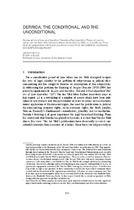| dc.contributor.author | De Ville, Jacques | |
| dc.date.accessioned | 2012-07-18T09:26:18Z | |
| dc.date.available | 2012-07-18T09:26:18Z | |
| dc.date.issued | 2007 | |
| dc.identifier.citation | De Ville, J. 2007. Derrida, the conditional and the unconditional. Stellenbosch Law Review, 18: 253-285 | en_US |
| dc.identifier.issn | 1016-4359 | |
| dc.identifier.uri | http://hdl.handle.net/10566/382 | |
| dc.description.abstract | In his recent book, Law and Sacrifice: Towards a Post-Apartheid Theory of Law, Johan van der Walt gives a clear exposition of the possible impact of inter alia Jacques Derrida's thinking on law. In this article, the book is critically analyzed and it is shown that Derrida's texts provide scope for a different interpretation. With reference to a number of themes it is shown that Derrida's thinking is more far reaching than in Van der Walt's model. The unconditional for example plays a vital role in Derrida's thinking while it is almost absent in Van der Walt's model. Van der Walt stresses the need for plurality and the impossibility of reconciliation between different views of the law in a particular case. Such an approach can have conservative political consequences. A different interpretation of Derrida, where the unconditional is more prominent, holds more promise for a post-apartheid theory of law. | en_US |
| dc.language.iso | en | en_US |
| dc.publisher | Juta Law | en_US |
| dc.rights | Copyright Juta Law. This file may be freely used provided that the source is acknowledged. No commercial distribution of this text is permitted | |
| dc.subject | Derrida, Jacques | en_US |
| dc.subject | Deconstruction | en_US |
| dc.subject | Friendship | en_US |
| dc.subject | Reconciliation | en_US |
| dc.subject | Hospitality | en_US |
| dc.subject | Justice | en_US |
| dc.subject | Language | en_US |
| dc.subject | Time | en_US |
| dc.title | Derrida, the conditional and the unconditional | en_US |
| dc.type | Article | en_US |
| dc.inquiries | jdeville@uwc.ac.za | |
| dc.privacy.showsubmitter | true | |
| dc.status.ispeerreviewed | true | |

